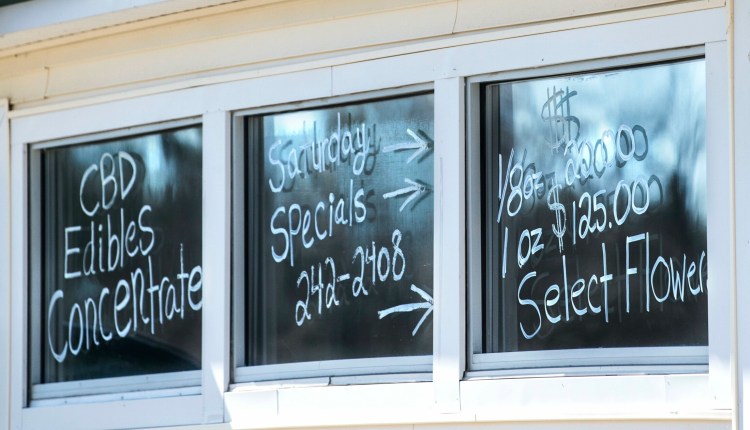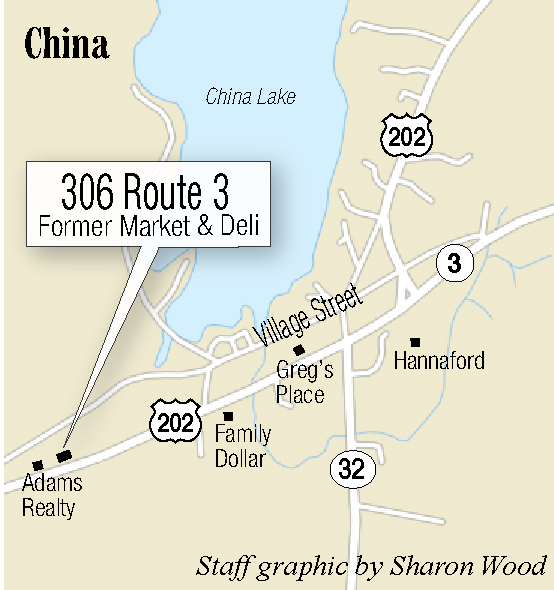CHINA — Town officials and the owner of a medical marijuana business are in disagreement involving recreational sales.
Changing state policies appear to have caused the confusion at the municipal level about what medical marijuana facilities are and are not legally allowed to do.
Sgt. Tracey Frost, who works part time for the China police, said Tuesday at a Select Board meeting that he thought a cultivation facility at 306 Route 3 was in violation of a town ordinance banning retail marijuana establishments and social clubs. Town Manager Dennis Heath asked that Frost “look into it” about two weeks ago, though Frost said he had not received any complaints about it from the public.
“It’s a retail business,” Frost said, later adding, “He even advertises the rates on the front window.”
Displayed on the building’s front windows in white paint are phrases that include: “CBD,” “Edibles,” “Concentrate,” “Saturday Specials,” “1/8 oz. $20.00” and “1 oz. $125.00 Select Flowers.”
Nathan White, who owns the unnamed business, said Wednesday that he had not violated any state or local laws and that Frost had never spoken to him. White is a state-licensed medical marijuana caregiver.
“I’ve got the OK to do this,” he said. “My insurance company knows what I’m doing, and they don’t have a problem with it. This is the first I’ve heard (of any problems).”
White received the China Planning Board’s approval for a conditional use permit on Dec. 13, 2016, allowing him to use the former Dollar Store building to cultivate medical marijuana for five patients and himself.
“All medication will be delivered to patients, so there will be no new traffic at this site,” he noted in a memo attached to the permit in the town’s records.
Later, on Feb. 27, 2018, White obtained a certificate of occupancy for “Medical Marijuana Cultivation and Sales” approved by the Planning Board and signed by Code Enforcement Officer Paul Mitnik. This is when White said he transitioned from delivering marijuana to qualifying patients to selling marijuana in a small space inside his cultivation facility.
If he were no longer permitted to sell medical marijuana at his shop on Route 3, White said, “it would essentially cripple me.”
“I’ve put every cent I’ve ever made into this place,” he said.
The certificate of occupancy notes that White’s activities must be compliant with the Maine Medical Use of Marijuana Act. The town’s ordinance that bans retail sales of marijuana similarly notes that it does not override “any lawful use, possession or conduct” pursuant to that act.
The Maine Medical Use of Marijuana Act currently enables state-licensed medical marijuana caregivers to “operate one retail store to sell harvested marijuana to qualifying patients for the patients’ medical use.” A July 2018 amendment also specified that “a municipality may not … prohibit registered caregiver retail stores, registered dispensaries, marijuana testing facilities and manufacturing facilities that are operating with municipal approval in the municipality prior to the effective date of this section,” which was after White received retail authorization.
“I think there probably is (some confusion), just ’cause the laws have changed a couple of times,” Mitnik said.
Heath said the issue of concern was not that White had a medical retail operation, but that he was selling marijuana for recreational use in addition to medical use.
“That’s the violation,” Heath said. “They have apparently admitted to our police officer that they are selling recreational marijuana, not purely for medical use.”
White said that claim is false and that he sells only to people who “come to the door with a current (medical marijuana patient registration) card.” He said he knows that it is against the law to sell recreational marijuana.
Frost was on vacation Thursday and said he could not respond to any questions. It is unclear how he determined that White allegedly was selling marijuana to nonmedical clients, aside from the observation of rates posted on the windows.
“I have to rely on Tracey — that he did visit the establishment, did talk to the proprietor, and that they are in fact selling (recreational) retail,” Heath said. “I have to rely on what’s told to me by a police officer.”
Mitnik, who is ultimately responsible for writing up any ordinance violations, said he doesn’t believe White has breached the town ordinance and does not plan to take any action, despite Heath’s and Frost’s interpretation of the situation.
“As far as I know, I spoke to the person there, who I trust a lot and know personally, and he’s only selling to people who provide cards; and he asks for IDs,” Mitnik said. “I don’t have any evidence that he is … selling to anyone else, and for me to make any enforcement action or say that he is in violation of some law — if I’m not sure, I’m not going there.”
State law doesn’t prohibit medical marijuana retail outlets from advertising rates or products on the outside of shops. It does provide some restrictions to signs, advertising and marketing used by dispensaries and registered caregivers, including that these materials cannot make claims about health or physical benefits of marijuana, cannot be designed to appeal to people under the age of 21 and cannot market adult use or recreational marijuana within the same material it uses to market medical marijuana.
Mitnik said he doesn’t think there is anything wrong with the way White has chosen to market his products.
“He clearly states in his signage that he’s a medical marijuana facility,” Mitnik said. “I haven’t received any complaints on the signage on the window.”
“Without (the signage), people would never know who I am,” White said.
In addition to the white window writing, there is a small banner with a green cross hanging on the front of the building, which is typical of medical marijuana dispensaries.
NUMBER OF CLIENTS
Another point of confusion that has circulated locally involves the number of clients a licensed medical marijuana caregiver can serve. Heath said that it was his understanding that White could sell only to a limited number of patients and that the advertising on the window indicated that he was hoping to draw people in outside of that limited clientele. Heath noted that he could have misinterpreted the statute.
Though White’s initial 2016 conditional use permit authorized him to “cultivate for five patients plus myself,” he acknowledged Wednesday that “the idea was never to have five full-time clients.” Instead, he said that he used the fifth patient slot as a “revolving door,” and served more than five patients, but could not provide a specific number of clients.
This practice was not against the law, according to Nicky, an employee of the state’s Medical Marijuana Program who said she did not want to provide her last name. The office she works for processes medical marijuana caregiver applications for the state.
“It’s not really something we encouraged or anticipated,” she said. “It just happened, but it’s not expressly against the law.”
As of December 2018, however, Maine legislators lifted the limit on the number of patients a caregiver can provide to. Instead, it adopted a plant-based limit. When applying for a caregiver license, individuals have to specify how many mature and immature marijuana plants they plan to cultivate, which require different fees, ranging from $240 for six mature and 12 immature plants to $1,200 for a maximum of 30 mature and 60 immature plants.
White rents the building on Route 3 from Thadius Barber.
Meg Robbins — 861-9239
Twitter: @megrobbins
Send questions/comments to the editors.





Success. Please wait for the page to reload. If the page does not reload within 5 seconds, please refresh the page.
Enter your email and password to access comments.
Hi, to comment on stories you must . This profile is in addition to your subscription and website login.
Already have a commenting profile? .
Invalid username/password.
Please check your email to confirm and complete your registration.
Only subscribers are eligible to post comments. Please subscribe or login first for digital access. Here’s why.
Use the form below to reset your password. When you've submitted your account email, we will send an email with a reset code.